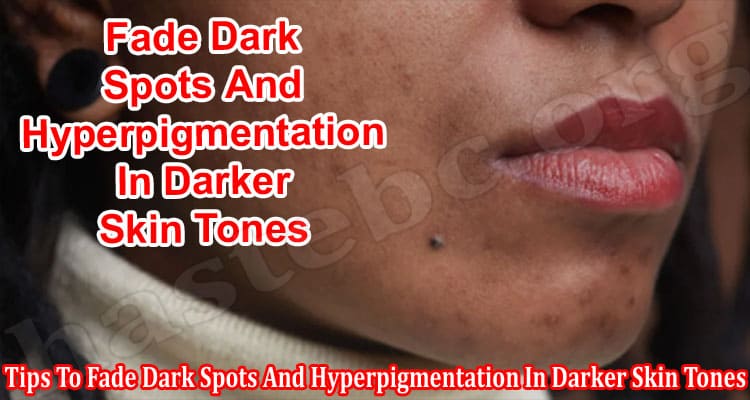Dark spots and hyperpigmentation is a skin condition in which certain parts of the skin become darker than the rest of the skin. This darkness usually appears on the skin in the form of spots or patches. It is caused by the overproduction of melanin in these areas of the skin and is more prevalent in darker skin tones.
These dark patches or spots are usually not dangerous but can make one conscious of their appearance. Also, they may be an outcome of skin damage that you should prevent. Therefore, most people suffering from hyperpigmentation seek tips on how to fade dark spots. Understanding the root cause of hyperpigmentation and taking preventive measures to avoid skin damage is the key here.
How Is Hyperpigmentation Diagnosed?
If you are suffering from hyperpigmentation, your healthcare provider will follow these steps for your diagnosis:
- They will visually inspect your skin and study the areas affected by hyperpigmentation to identify the root cause.
- They may ask you about your medical history, diet, lifestyle, and any medication you are on currently to rule out these reasons for hyperpigmentation.
- In some cases, they may perform a biopsy to rule out severe conditions like skin cancer.
- They may also conduct certain tests to measure your hormone levels, as they can be an underlying cause of hyperpigmentation.
Based on the results of these tests, your healthcare provider will determine the root cause behind your hyperpigmentation and prescribe the treatment accordingly. You may reverse some types of hyperpigmentation with at-home products like rejuvenating serums, while others may need in-clinic treatment.
Top Causes Of Hyperpigmentation
- Sun Damage – Excessive sun exposure might increase melanin production in the skin and may cause dark spots. These are often called age spots or liver spots.
- Acne or Skin Injury – Acne or skin injuries can lead to post-inflammatory hyperpigmentation. It is caused by increased production of melanin in the skin after any type of inflammation.
- Reaction To Some Medicines – According to studies(1), some medicines can cause pigmentation in the skin, which tends to fade slowly over the years after you stop taking the medicine. These medicines include oral contraceptives, antimalarials, and Clofazimine, among others.
- Melasma – Melasma is a skin condition marked by patches of discoloration on the skin due to hormonal disturbances. It is the most prevalent among pregnant women.
Best Treatments For Hyperpigmentation In Darker Skin Tones
- Hydroquinone – Hydroquinone is a popular skincare ingredient for lightening dark spots. It is available in topical formulations but usually requires a prescription because of its potency and possible side effects. Consult a dermatologist before trying out this treatment.
- Chemical Exfoliation – Chemical exfoliation with AHAs and BHAs can gently remove the upper layers of the skin, encouraging faster skin renewal to fade dark spots and hyperpigmentation. At-home chemical exfoliants are usually gentler and suitable for mild pigmentation, while in-clinic peels are much more concentrated and ideal for stubborn pigmentation.
If you are looking for an exfoliating product to use at home, you can try Tru Alchemy Spot Check. This serum contains Lactic Acid to gently exfoliate the skin, along with brightening Vitamin C and Niacinamide. It also contains Hyaluronic Acid, which hydrates, soothes, and plumps the skin. Tru Alchemy Spot Check reviews by consumers are mixed, and this product helped many users fade their dark spots efficiently. So, you can consider giving this serum a shot.
- Laser Treatment – Laser treatment is an effective solution for how to remove dark spots. It uses light energy to target pigmentation directly or to remove the superficial layers of the skin to fade dark spots. Your dermatologist may prescribe you this treatment along with topical solutions.
- Topical Treatments – Studies(2) have established that various active ingredients in the form of topical treatments may diminish hyperpigmentation. These include azelaic acid, kojic acid, and retinoids. Azelaic acid and Kojic acid inhibit melanin production to reduce pigmentation, while retinoids encourage faster skin renewal to fade dark spots. These ingredients can be found in over-the-counter products, but stronger concentrations may require a prescription.
You can also pair these with skin-brightening and anti-inflammatory activities, such as Niacinamide and Vitamin C, for even better results. These ingredients are essential vitamins for healthy skin that can help you achieve an even-toned complexion.
- Home Remedies – Home remedies may not be effective in fading stubborn hyperpigmentation. However, you can use aloe vera gel to soothe inflammation and minimize post-inflammatory hyperpigmentation. Additionally, you can use a gentle DIY scrub with honey and gram flour to exfoliate dead skin and fade pigmentation faster.
How To Prevent Hyperpigmentation
- To avoid sun damage, use sunscreen with SPF 30 or higher every single day. Reapply every 2-3 hours when you are outdoors or in a brightly lit room.
- To further prevent sun damage, wear protective clothing like hats, scarves, and gloves if you spend a lot of time outdoors during the day.
- Use rejuvenating serumswith brightening ingredients like Vitamin C that help to reverse sun damage and hyperpigmentation.
- Seek the appropriate medical treatment for any underlying health conditions, such as hormonal disorders, as these can lead to pigmentation and may also have other health impacts.
- Consume a healthy diet replete with essential vitamins for healthy skin. It can minimize skin damage and inflammation, reducing the risk of hyperpigmentation.
Conclusion
Hyperpigmentation is a skin condition marked by unsightly dark spots or patches that destroy the even complexion of the skin. This skin concern is usually more prevalent in those with darker skin tones, as their skin naturally produces a higher concentration of melanin. Moreover, hyperpigmentation in darker skin tones is usually more stubborn and difficult to fade.
However, thanks to modern treatments, you do not need to lose hope if you suffer from hyperpigmentation on dark skin. You can try at-home skincare products with anti-pigmentation, brightening, and exfoliating ingredients. Some of the positive Tru Alchemy Spot Check reviews indicate that this serum may be an effective solution for hyperpigmentation. Furthermore, if you have stubborn hyperpigmentation, consult a dermatologist for prescription medicines and in-clinic treatments like laser therapy and chemical peels.
With a myriad of promising solutions to address hyperpigmentation, you shouldn’t lose your mind over dark spots anymore. So, try these treatment and prevention tips for clear and even-toned skin!

Caroline is a dedicated writer with a passion for keeping readers informed. Specializing in providing the latest news updates and unbiased reviews, she strives to deliver accurate and insightful content. With a keen eye for detail and a commitment to journalistic integrity, Caroline ensures that her readers are always well-informed. Stay tuned for her latest articles to stay up-to-date on current events and trends.




